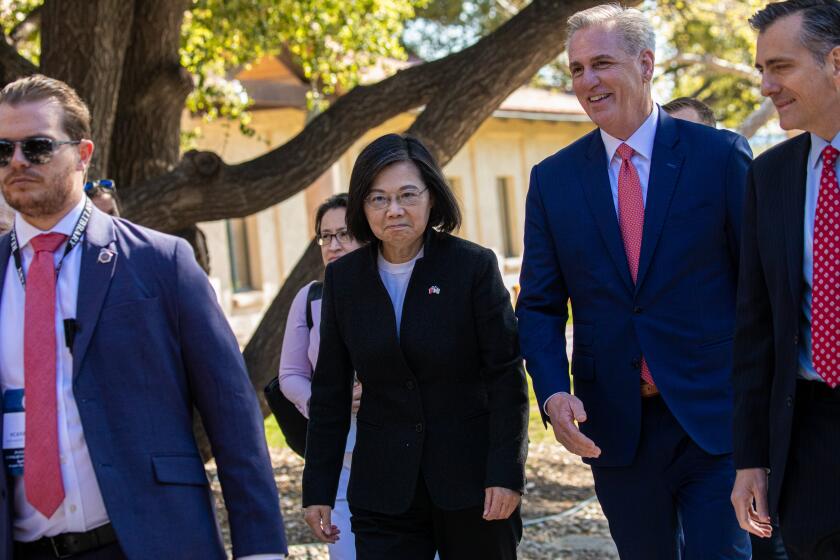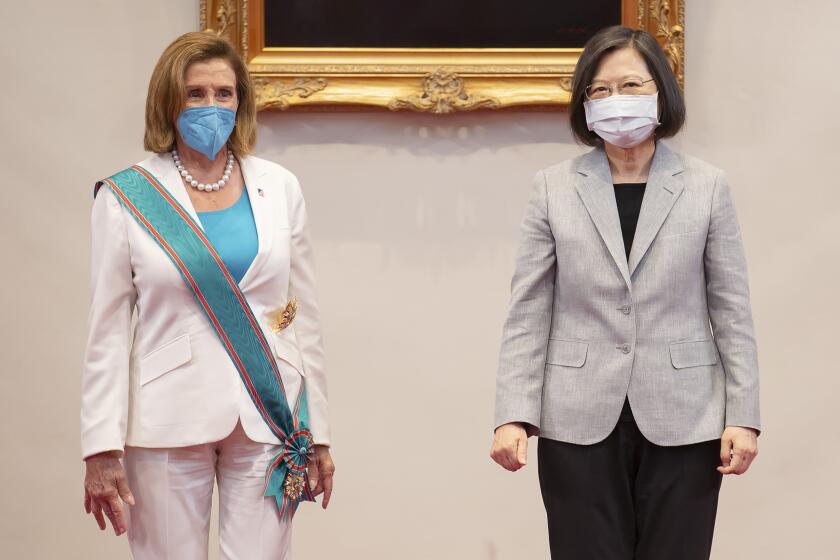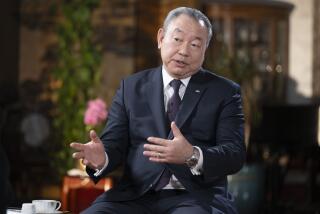Taiwan president’s meeting with McCarthy inflames divide among local immigrants
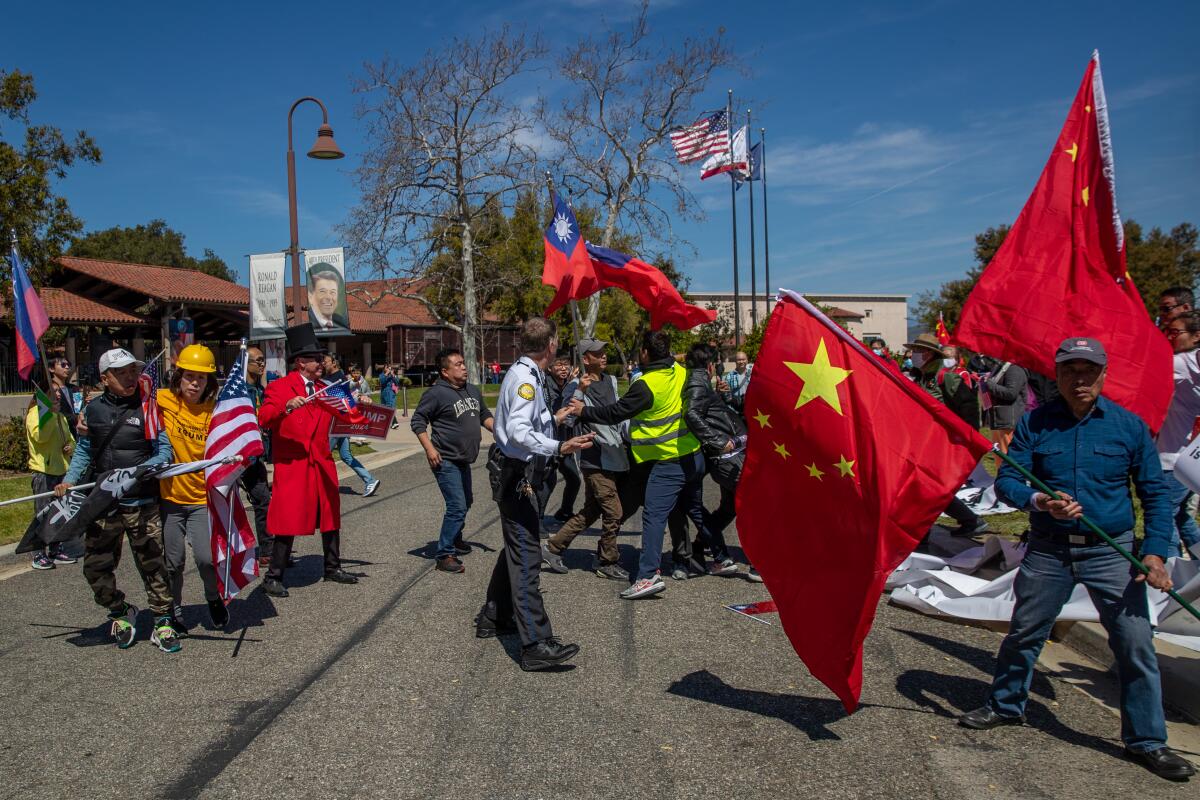
- Share via
As a highly anticipated meeting took place between Taiwanese President Tsai Ing-wen and House Speaker Kevin McCarthy, Nancy Yingli Son shouted into a microphone.
“Taiwan is China’s territory! Taiwan is part of China!” she declared in Mandarin outside the Ronald Reagan Presidential Library, clutching a Chinese flag and a U.S. flag.
Elsewhere among the hundreds who had gathered to support Tsai or protest her, drummers pounded and people chanted, “Jiayou, Taiwan!” — Go, Taiwan.
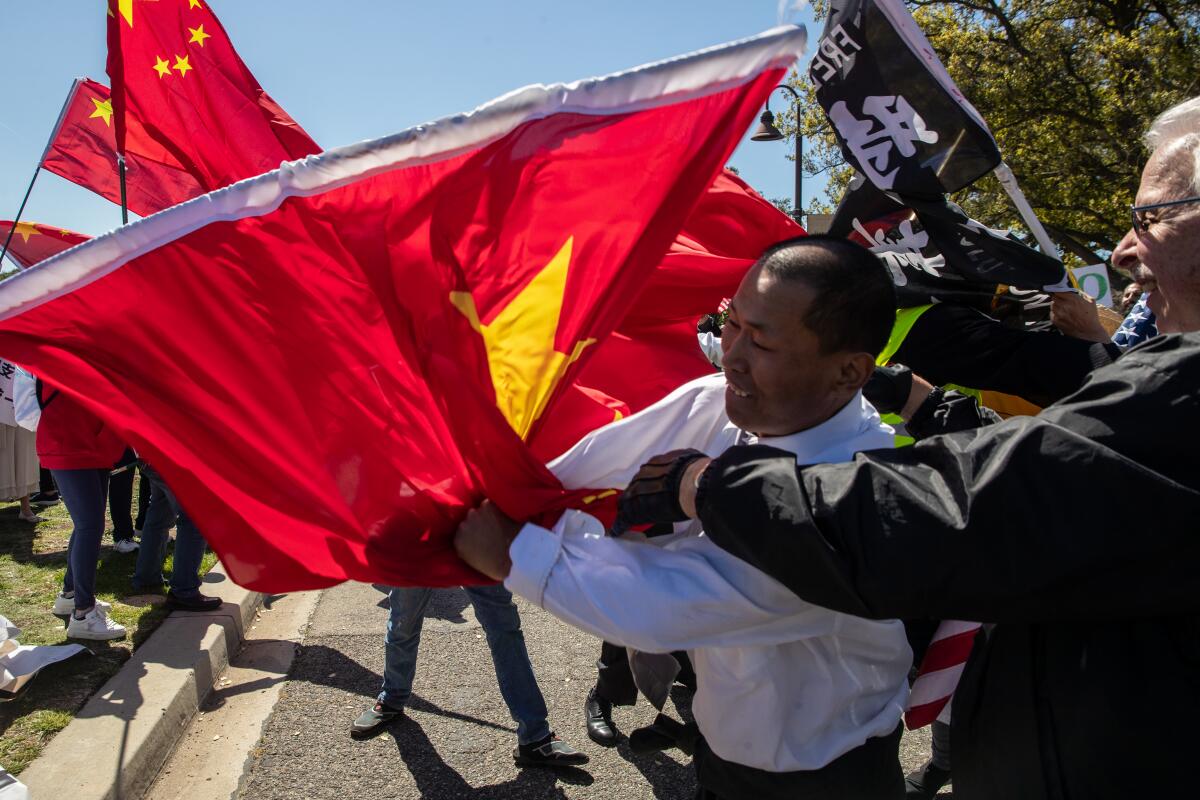
Tsai’s meeting with McCarthy and other Congress members on Wednesday has drawn condemnation and threats of retaliation from Chinese officials who, like Son, believe that Taiwan, a self-governing democracy, is a breakaway region that rightfully belongs to Beijing.
Among local immigrants, the meeting has intensified passions across an intractable ideological divide, as U.S.-China relations have deteriorated and China’s threat to take Taiwan by force if necessary seems increasingly real.
“I have a message to send to the world — America’s government must support China,” said Son, 62, a paralegal who lives in Koreatown and was born in Shenyang, China, before friends whisked her away to continue her speechifying at another spot.
Linda and Dennis Luc, who are immigrants from Taiwan, took a day off from work to come to the library and support Tsai.
The Lucs, members of the Taiwanese Assn. of Northwest Los Angeles, each waved a homemade sign with a large red heart and the words, “Taiwan Go! Go! Go!”
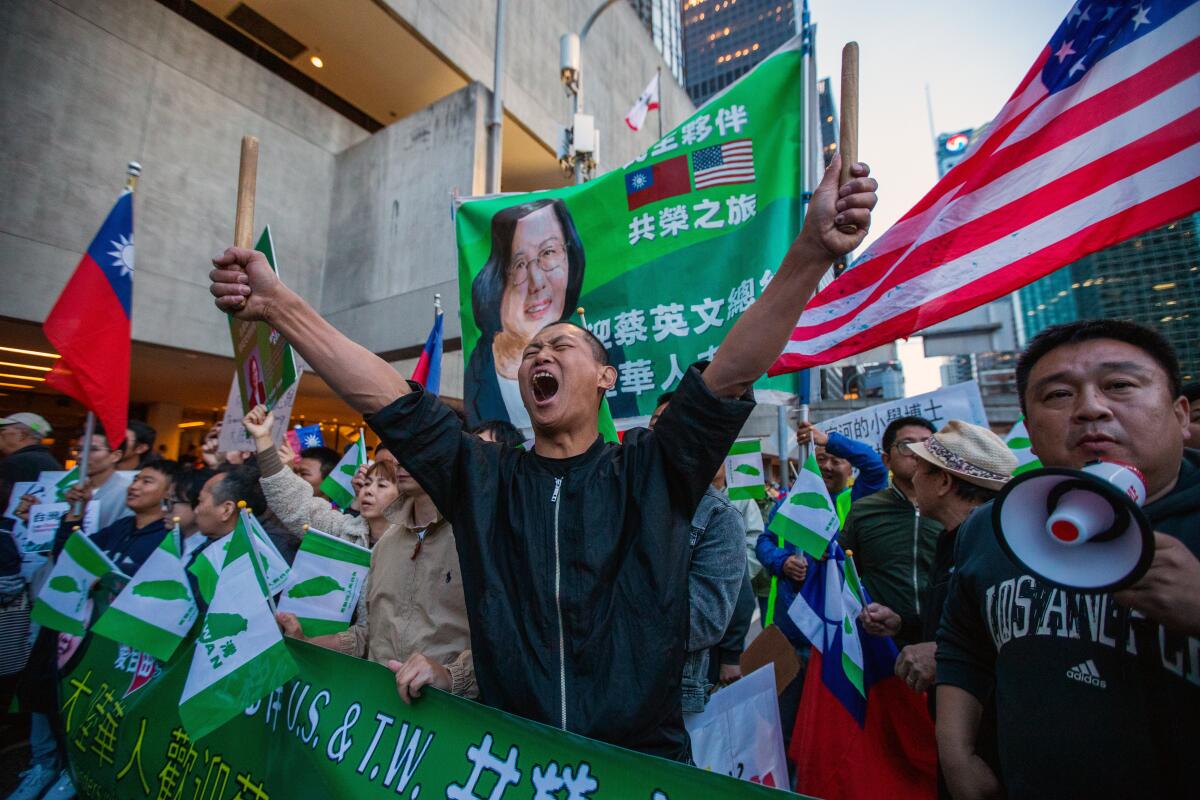
“I’m very happy she can go anywhere she wants. Nobody can dictate to her. This is a freedom country, and we hope for that same freedom for Taiwan,” said Dennis Luc, 63, who works in electronics assembly.
In a short speech after his hourlong meeting with Tsai, McCarthy invoked President Reagan and “his belief in democracy and commitment to the idea of peace and freedom.”
“Those values have always served as the bedrock of our friendship with the people of Taiwan,” he said. “And they are more important now than ever before. I believe our bond is stronger now than any time or point in my life.”
He said the U.S. will honor its obligation to Taiwan, which he did not explicitly define, and noted that the meeting, which included 12 Republicans and 6 Democrats, was bipartisan.
“The friendship between the people of Taiwan and America is a matter of profound importance to the free world, and it is critical to maintain ... freedom, peace and regional stability,” said McCarthy, a Republican from Bakersfield.
Tsai echoed McCarthy in noting that the long-standing relationship between Taiwan and the U.S. is critical.
“The unwavering support reassured the people of Taiwan that we are not isolated,” she said. “We are not alone.”
She also cited Reagan, who said that freedom is never more than one generation away from extinction.
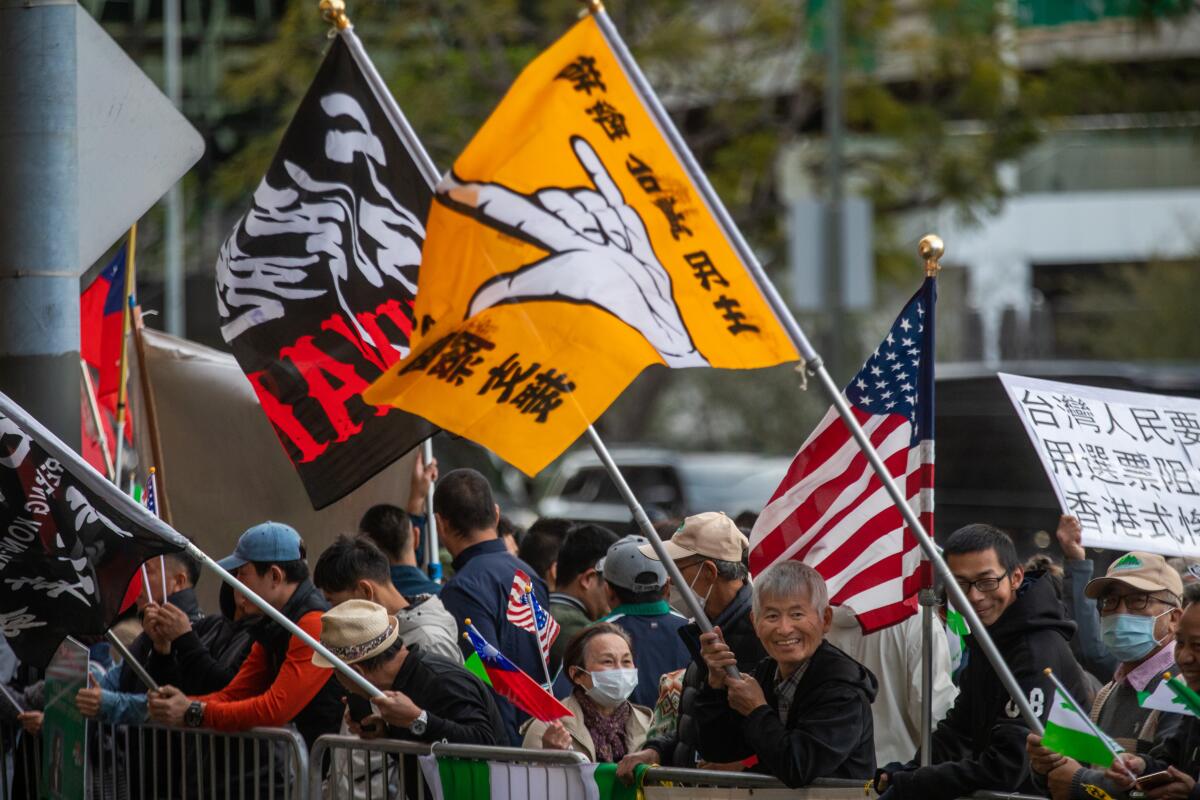
“It is no secret that today, the peace that we have maintained and the democracy which we have worked hard [to build] ... are facing unprecedented challenges,” Tsai said. “We once again find ourselves in a world where democracy is under threat, and the urgency for keeping the beacon of freedom shining cannot be understated.”
A visit to California by the current president of Taiwan and a trip to China by her predecessor encapsulate the choices facing the self-ruled island.
Tsai said she reiterated to the congressional delegation that Taiwan is committed to upholding the status quo, which the Taiwanese government has defined as “no unification, no independence, and no use of force.”
“To preserve peace, we must be strong,” she said, paraphrasing Reagan. “I would like to add that we are stronger when we are together.”
After the meeting, China’s Ministry of Foreign Affairs said in a written statement, “In response to the egregiously wrong action taken by the United States and Taiwan, China will take strong and resolute measures to defend our sovereignty and territorial integrity.”
The previous House speaker, Nancy Pelosi (D-San Francisco), visited Taiwan in August, prompting Beijing to launch missiles over the area, deploy warships into the Taiwan Strait and carry out military exercises in a simulated blockade of the island.
McCarthy had originally planned to meet Tsai in Taiwan. But to avoid further provoking China, the meeting took place during Tsai’s trip to the U.S. and Central America.
Speaking to the media with other Congress members Wednesday afternoon, McCarthy said he doesn’t have specific plans to visit Taiwan. But he didn’t rule out the possibility of going.
China’s furious response could drive more Taiwanese toward independence and push neighboring Asian nations to strengthen their defense strategies.
“I would not go for a simple purpose for myself ... and it wouldn’t be in an adversary role,” he said.
Tsai spent two nights in New York, then visited Guatemala and Belize, which are among Taiwan’s few remaining formal diplomatic allies, before arriving in L.A. on Tuesday.
Beijing views Tsai and her Democratic Progressive Party as Taiwan independence activists, even though Tsai’s public statements are carefully calibrated to avoid crossing that line.
After she was elected to her first term as president in 2016, Tsai declined to endorse the concept that Taiwan and the mainland are part of one China, prompting Beijing to cut diplomatic contact with her.
Speaking to reporters Wednesday at a meeting in Brussels of NATO foreign ministers, U.S. Secretary of State Antony J. Blinken said that “transits” through the U.S. by Taiwanese presidents are nothing unusual, nor are meetings with American elected officials.
In 2018, Tsai made a public speech in L.A. and toured NASA’s mission control complex in Houston. Her visit to an 85C Bakery Cafe, which is headquartered in Taiwan and has multiple locations in Southern California, prompted calls from China supporters to boycott the business.
“So it’s a long way of saying that, given that, Beijing should not use the transits as an excuse to take any actions to ratchet up tensions to further push at changing the status quo,” he said. “And our objective remains the same, to have peace, to have stability across the Taiwan Strait, and to ensure that any differences that exist between mainland and Taiwan are resolved peacefully.”
Bonny Lin, a senior fellow for Asian security and director of the China Power Project at the Center for Strategic and International Studies, said Beijing’s response to the McCarthy-Tsai meeting could range from military drills to economic sanctions, saying she wouldn’t be surprised if there is at least a medium-sized military response.
“We also know that China’s response has been more extreme over time,” Lin said. “As China’s military capability has increased, as China’s overall power has increased, Beijing no longer feels that it needs to tolerate these types of activities.”
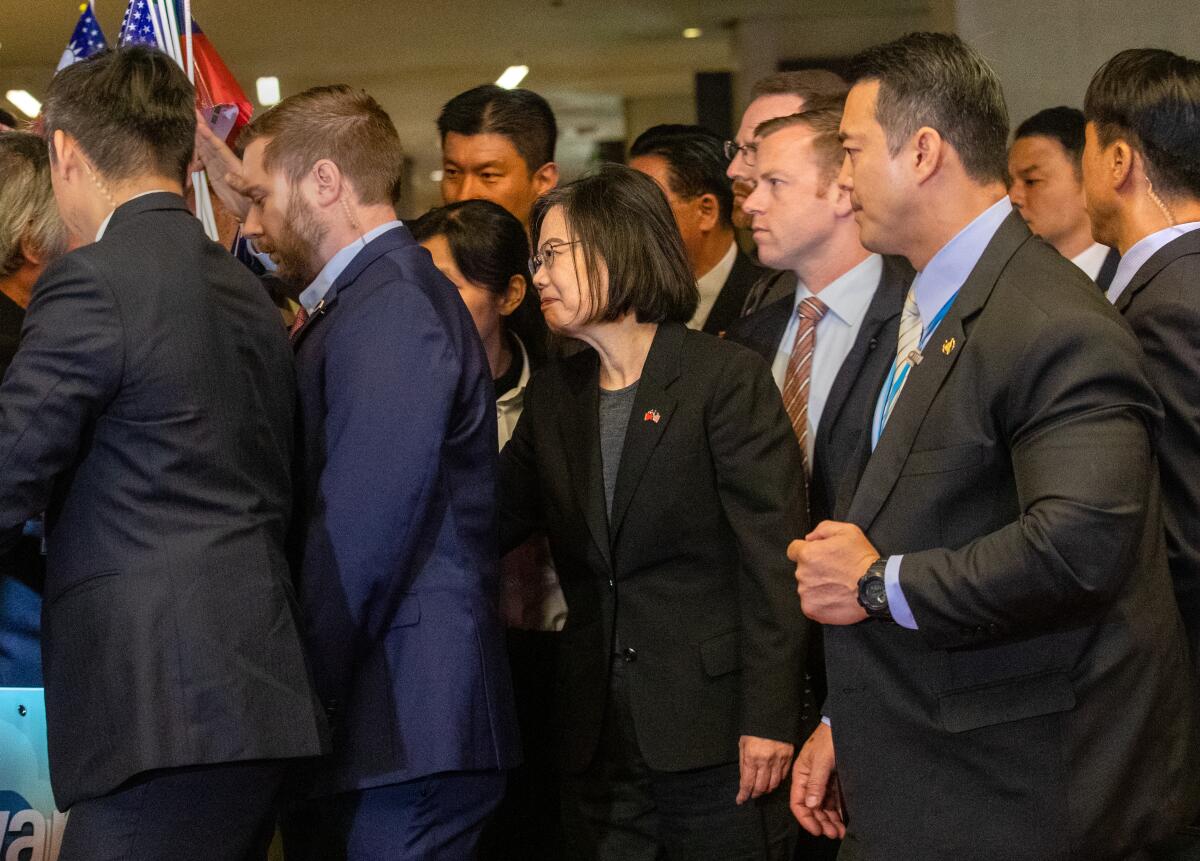
As Tsai stepped out of her car in front of the Westin Bonaventure Hotel after arriving in Los Angeles Tuesday night, pro-China protesters chanted, “Against Taiwan independence! One China!” in Mandarin.
Tsai waved to supporters displaying U.S. and Taiwan flags.
Ziyun Zhang, a 30-year-old Uber driver, is from China but traveled from the Bay Area to root for Tsai.
He said he moved to the U.S. in 2020 after criticizing the Chinese government and Hong Kong’s extradition law on the WeChat app. He said Chinese police interrogated him for an hour and warned that he would go to jail if he continued to speak out.
“We still support [Tsai] because of democracy,” Zhang said. “She also stands with us ... She stands against the dictatorship of the [Chinese Communist Party].”
Before Tsai arrived, small scuffles broke out when some of her supporters tried to snatch signs from the pro-China crowd. Police eventually separated the two groups by a few yards. Still, they engaged in occasional shouting matches, chanting dueling slogans.
One China supporter, Peter Wei, said he doesn’t see a difference between people from mainland China and Taiwan.
“We have the same cultural background. We speak the same language,” said Wei, an engineer who came to the U.S. from Beijing in 1990 at age 13.
Wei, president of the Chinese American Community Assn. in Southern California, thinks that Tsai’s visit will aggravate anti-China sentiment in the U.S.
“Her purpose is not to rest on her way to Central America,” Wei said. “Her purpose is to ruin the relationship between the U.S. and China.”
Times staff writer Tracy Wilkinson contributed to this report.
More to Read
Sign up for Essential California
The most important California stories and recommendations in your inbox every morning.
You may occasionally receive promotional content from the Los Angeles Times.
